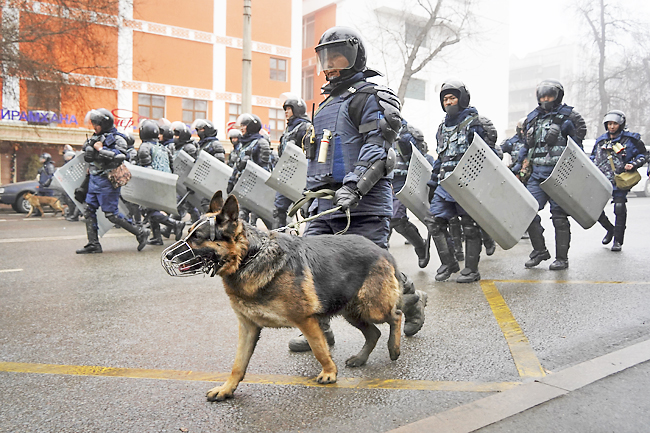MOSCOW (AP) – Security forces killed dozens of protesters and 12 police died during extraordinarily violent demonstrations in Kazakhstan that saw government buildings stormed and set ablaze, authorities said yesterday.
One police officer was found beheaded in escalating unrest that poses a growing challenge to authoritarian rule in the Central Asian nation.
Despite the severe response by authorities, protesters took the streets again in the country’s largest city, Almaty, a day after breaking into the presidential residence and the mayor’s office there.
Police were out in force again, including in the capital of Nur-Sultan, which was reportedly quiet, and Russian troops were on their way.
Russia’s Sputnik news service reported that shots were fired as police surrounded one group of about 200 protesters in the city. So far, 2,000 people have been arrested, the Interior Ministry said.
In the unrest on Wednesday, “dozens of attackers were liquidated”, police spokeswoman Saltanat Azirbek told state news channel Khabar-24, using a term common to describe the killing of people thought to be extremists by law enforcement.

Twelve police officers were killed in the unrest and 353 injured, according to city officials cited by the channel.
Tens of thousands of people, some reportedly carrying clubs and shields, have taken to the streets in recent days in the worst protests the country has seen since gaining independence from the Soviet Union three decades ago. Although the demonstrations began over a near-doubling of prices for a type of vehicle fuel, their size and rapid spread suggest they reflect wider discontent in the country that has been under the rule of the same party since independence.
The government yesterday announced a 180-day price cap on vehicle fuel and a moratorium on raising utility rates – an attempt to address the economic issues that catalysed the protests, though it was unclear what, if any, effect the moves would have.
The president has vacillated between attempts at mollifying the protesters, including accepting the resignation of his government, and promising harsh measures to quell the unrest, which he blamed on “terrorist bands”.
Worries that a broader crackdown could be on the horizon grew after he called on a Russia-led military alliance for help. Severe interruptions to internet service also raised concern and made it difficult – sometimes impossible – for news of what was happening inside Kazakhstan to get out. In other apparent attempts to seal the country off, the airports in Almaty and one other city have also been shut.
The military alliance, the Collective Security Treaty Organization (CSTO), said early yesterday that it would send peacekeeper troops to Kazakhstan at Tokayev’s request.
The operation is the first military action by the CSTO – an indication that Kazakhstan’s neighbours, particularly Russia, are concerned that the unrest could spread.
Russia and Kazakhstan share close relations and a 7600-kilometre border, much of it along open steppes. Russia’s manned space-launch facility, the Baikonur Cosmodrome, is in Kazakhstan.
The size and duties of the peacekeeping force have not been specified. Russia has already begun sending forces, according to the CSTO, which also includes Kazakhstan, Armenia, Belarus, Kyrgyzstan and Tajikistan.
But Kyrgyzstan’s presidential spokesman, Erbol Sutanbaev, said his country’s contingent must be approved by Parliament and said that the troops would not take actions involving demonstrators.
It was not immediately clear if any of the Russian forces had arrived in Kazakhstan.
Tokayev has imposed a two-week state of emergency for the whole country, including an overnight curfew and a ban on religious services.
Of the five Central Asian republics that gained independence following the dissolution of the Soviet Union, Kazakhstan is by far the largest and the wealthiest, spanning a territory the size of Western Europe and sitting atop colossal reserves of oil, natural gas, uranium and
precious metals.






